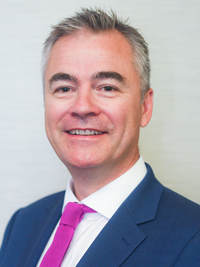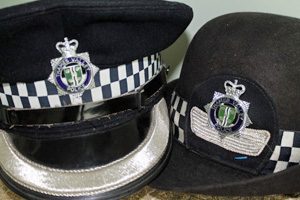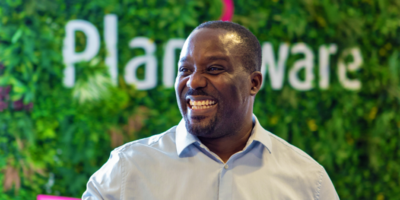Paul Fotheringham became president of the Police Superintendent’s Association in March 2022 after having been elected for a three-year term of office. His entire career’s service has been with Kent Police where he has been for almost 30 years, carrying out a variety of roles, starting in local policing before moving into specialist crime, including protecting vulnerable people, serious crime and homicide investigation. Paul has been a Police Superintendent’s Association branch official for the past six years, a district official and a member of the National Executive Committee for three years.

“Any organisation thrives on difference. Every one of us brings something different to the table, whether that’s from our community background, our race, religion, or specialist experience.”
Career to date
I started with a career in sales before moving into policing when I was 24. I followed the career journey of my dad who was also a police officer, as has my sister — so it really is in the blood!
My entire service has been with Kent Police where I have been for almost 30 years, carrying out a variety of roles, starting in local policing before moving into specialist crime. I was elected to the role of president of the Police Superintendents’ Association in March 2022.
About the Police Superintendents’ Association
The Police Superintendent’s Association represents police officers at the rank of superintendent and chief superintendent in 49 forces. We represent them in everything from pay, pensions and conditions of service to wellbeing and inclusion.
We also use the experience and insight of our members to influence positive change in policing. As president, I lead our work, supported by a team of national officers and National Executive Committee.
The power of difference
There is no possible reason not to have inclusion as a focal point of any business or organisation. Difference in all its forms brings value to thinking and to service delivery, and we can only benefit from that. In terms of policing – this is something we have worked hard to improve over many years and although we’ve made great strides, we’re not where we want to be.

Personally, I have a direct interest in this through the experiences of my wife who works at a senior level in banking. Over the last 30 years she has experienced overt and covert discrimination and it has been so important for her to see female role models at a senior level, but more importantly to know that there are men who will support, mentor and recognise the wide benefits of inclusion across the workplace.
Bringing together minds
Any organisation thrives on difference. Every one of us brings something different to the table, whether that’s from our community background, our race, religion, or specialist experience. We need to bring this diversity of thought together in everything we do if we want to represent communities and deliver services that are truly designed for all.
Creating agile solutions that work
The job of policing is to keep people safe and prevent crime. That means we problem solve on a range of issues every day, and these issues change quickly.
We need diverse minds to help us create agile solutions that work. For example, if we identify a community issue, we need specialists across policing who may have knowledge in dealing with the issues that are happening, and we need representatives from the community itself to give their direct experience of what is happening. Making assumptions is dangerous, but together we can harvest knowledge and direct experience to inform our work that in turn lead to the best outcomes.
Initiatives to support diversity and inclusion in the police
This is a major national focus for UK policing and something that is dominating the strategic thinking of every chief constable. The new Police Race Action Plan is looking at this issue in a different way to anything we have seen in our Service to date, and one of the major changes is the introduction of an independent scrutiny board. This means accountability and independent insight sits at the heart of the plan.
Within our own association, we’ve championed diversity and inclusion for some time and are proactively looking to change the face of senior ranks in policing which we know do not represent our communities or the wider workforce. Just 5.1% of our members are from Black, Asian or minority ethnic backgrounds and only 26% are female.
We developed a coaching and mentoring scheme three years ago, with senior leaders training as mentors to support colleagues from under-represented groups which is now delivered by the College of Policing and last year we launched Future Supers, a series of online workshops supported by bespoke mentoring from our members to support colleagues from these demographic groups with their career development.
We must take action on this matter and these kinds of initiatives can make a difference.
Seeing beyond the boxes society places people in
I’m proud to consider myself as an ally for all colleagues but especially for those that may have been disadvantaged in some way because of their protected characteristics. In policing and in society, we need to see beyond the boxes we place people in and allow people to flourish and be who they are.

As an ally, I will support anyone in being able to do this and to access the opportunities they are entitled to. I have proactively sought difference in my teams to the extent that over 50% of a team I recently led for five years was female. This is about active leadership, showing those with caring responsibilities that they can achieve their full work potential with our support.
One of the clear positives we should take from the pandemic is the widespread acceptance of the ability to be flexible in working patterns. If we look after our people by trusting them to work flexibly around their personal lives, they will look after their organisation, providing an even better service.
Diverse futures
I’m three months into the presidential role and really enjoying the challenge and the opportunity.
We’re developing our Future Supers programme and a peer support programme for our members. We’re preparing for our annual conference which will take place in September and will bring together key voices from across policing to discuss the matters of most importance for our service.
Alongside this, we continue to engage with and influence our stakeholders at a political level to make sure police officers are valued, with their well-being protected in every possible way.





